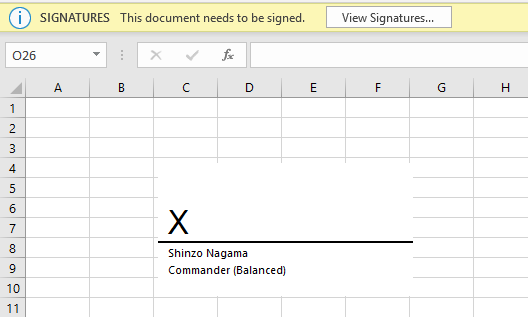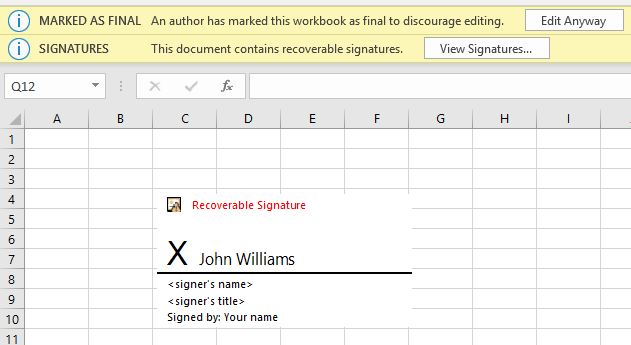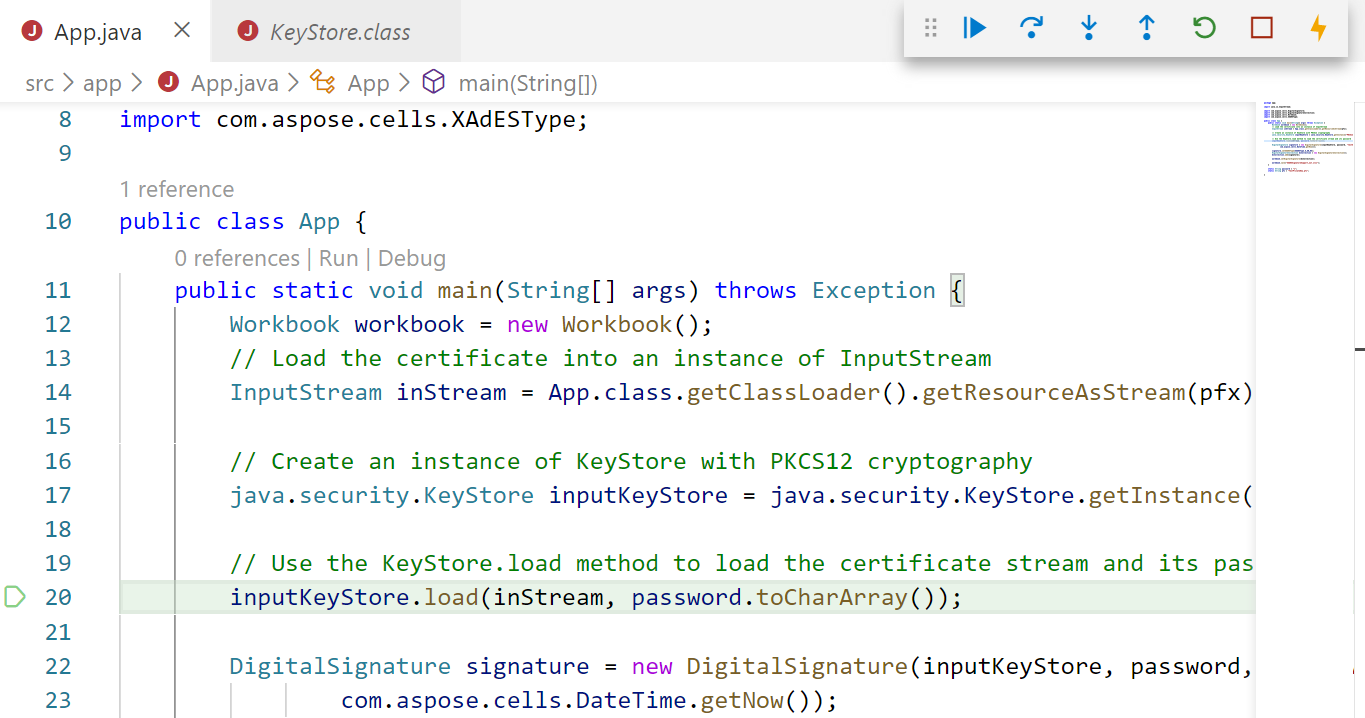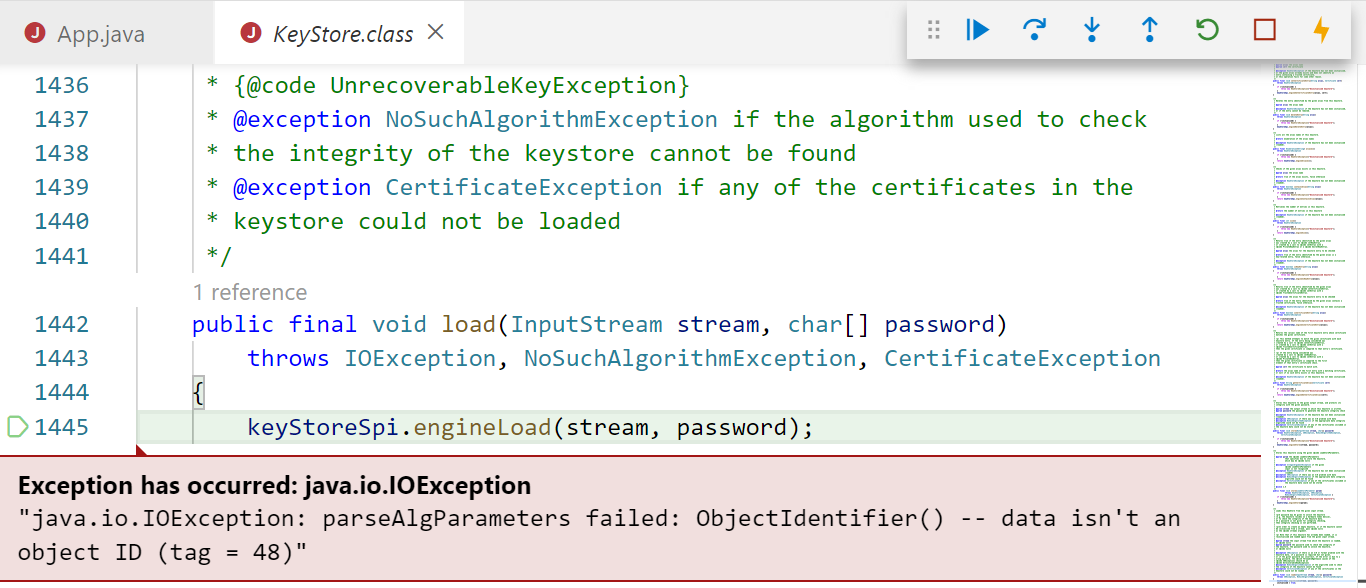- Document Solutions for Excel, Java Edition Overview
- Key Features
- Getting Started
-
Features
- Worksheet
- Workbook
- Comments
- Hyperlinks
- Sort
- Filter
- Group
- Conditional Formatting
- Data Validations
- Data Binding
- Import Data
- Digital Signatures
- Formulas
- Custom Functions
- Shapes
- Document Properties
- Styles
- Form Controls
- Barcodes
- Themes and Colors
- Chart
- Table
- Pivot Table
- Pivot Chart
- Sparkline
- Slicer
- Print Settings
- Logging
- Defined Names
- AI Assistant
- Templates
- Formula Reference
- File Operations
- Use JDK 8 Date Time API
- Document Solutions Data Viewer
- API Reference
- Release Notes
Digital Signatures
Digital signatures are the proof of a document's authenticity. A digitally signed document assures that it has been created by the signer and has not been changed in any way.
DsExcel allows users to add digital signatures to Excel spreadsheets to make them authentic and easier to validate.
Signature Lines
Signature lines act as a signature placeholder for digital signatures. They can be added to worksheet as signature line shapes which can be signed further.
Add Signature Line
The addSignatureLine method of ISignatureSet interface adds signature lines in a worksheet. You can also add information about the intended signer and instructions for the signer by using various methods of ISignatureSetup interface. When the workbook is opened again or sent to the intended signer as an Excel file, the signature line can be seen along with a notification that their signature is requested.
Refer to the following example code to add signature line in a worksheet.
Workbook workbook = new Workbook();
ISignature signature = workbook.getSignatures().addSignatureLine(workbook.getActiveSheet(), 100.0, 50.0);
// Add Signature lines
ISignatureSetup setup = signature.getSetup();
setup.setShowSignDate(false);
setup.setAllowComments(false);
setup.setSigningInstructions("Please check the content before signing.");
setup.setSuggestedSigner("Shinzo Nagama");
setup.setSuggestedSignerEmail("shinzo.nagama@ea.com");
setup.setSuggestedSignerLine2("Commander (Balanced)");
// Save to an excel file
workbook.save("AddSignatureLines.xlsx");The below image shows the signature lines in Excel:

Copy Signature Lines
You can copy a signature line to another range of worksheet or to another worksheet by using any of the below:
Duplicate signature line - By using duplicate method of IShape interface
Copy signature line's cell range - By using copy method of IRange interface
Copy worksheet containing signature line - By using copy method of IWorksheet interface
Refer to the following example code to copy a signature line to another range and another worksheet.
// Copy signature line with Range.Copy
IRange srcRange = activeSheet.getRange("A1:I15");
IRange destRange = activeSheet.getRange("A16:I30");
srcRange.copy(destRange);
// Copy signature line with Shape.Duplicate
signature.getSignatureLineShape().duplicate();
// Copy signature line with Worksheet.Copy
activeSheet.copy();Delete Signature Lines
You can delete a signature line by using any of the below:
Delete signature line - By using delete method of ISignature interface
Delete shape associated with signature line - By using delete method of IShape interface
Refer to the following example code to delete signature line in a worksheet.
// Create a new signature line and delete with Signature.Delete
ISignature signatureForTest = newSignatureLine.call();
signatureForTest.delete();
// Create a new signature line and delete with Shape.Delete
signatureForTest = newSignatureLine.call();
IShape signatureLineShape = signatureForTest.getSignatureLineShape();
signatureLineShape.delete();Move Signature Lines
Refer to the following example code to move signature lines to another range or a worksheet.
// Move signature line
IShape signatureLineShape = signatureShinzo.getSignatureLineShape();
signatureLineShape.setTop(signatureLineShape.getTop() + 100);
signatureLineShape.setLeft(signatureLineShape.getLeft() + 50);List Signature Lines
Refer to the following example code to list signature lines in a worksheet.
// Add first signature line
ISignature signatureShinzo = signatures.addSignatureLine(activeSheet, 100.0, 50.0);
ISignatureSetup setup1 = signatureShinzo.getSetup();
setup1.setShowSignDate(false);
setup1.setAllowComments(false);
setup1.setSigningInstructions("Please check the content before signing.");
setup1.setSuggestedSigner("Shinzo Nagama");
setup1.setSuggestedSignerEmail("shinzo.nagama@ea.com");
setup1.setSuggestedSignerLine2("Commander (Balanced)");
ISignature signatureKenji = signatures.addSignatureLine(activeSheet, 100.0, 350.0);
ISignatureSetup setup2 = signatureKenji.getSetup();
setup2.setShowSignDate(true);
setup2.setAllowComments(true);
setup2.setSigningInstructions("Please check the content before signing!");
setup2.setSuggestedSigner("Kenji Tenzai");
setup2.setSuggestedSignerEmail("kenji.tenzai@ea.com");
setup2.setSuggestedSignerLine2("Commander (Mecha)");
// List signatures with indexes
for (int i = 0; i < signatures.getCount(); i++) {
ISignature signature = signatures.get(i);
// change SuggestedSigner
if (i == 0)
signature.getSetup().setSuggestedSigner("Shinzo Nagama 123");
// change SuggestedSignerLine2
if (i == 1)
signature.getSetup().setSuggestedSignerLine2("Commander (Mecha 1234)");
}The getSignatureLineShape method in ISignature interface can be used while using signature line as a shape. Its members and their behavior is elaborated in the below table:
SignatureLineShape members | Get or Call Behavior | Set Behavior |
|---|---|---|
Adjustments | Supported | #N/A |
Adjustments.Count | Supported | #N/A |
Adjustments.Item | Not Supported | Not Supported |
Adjustments.GetEnumerator | Not Supported | #N/A |
AutoShapeType | Supported | Not Supported |
BottomRightCell | Supported | #N/A |
Chart | Not Supported | #N/A |
Connector | Supported | #N/A |
ConnectorFormat | Not Supported | #N/A |
Fill | Not Supported | #N/A |
GroupItems | Not Supported | #N/A |
HasChart | Supported | #N/A |
Hyperlink | Not Supported | #N/A |
IsPrintable | Supported | Supported |
Line | Not Supported | #N/A |
Locked | Supported | Supported |
Name | Supported | Supported |
Parent | Supported | #N/A |
ParentGroup | Not Supported | #N/A |
PictureFormat | Supported | #N/A |
PictureFormat.ColorType | Supported | Supported |
PictureFormat.Brightness | Supported | Supported |
PictureFormat.Contrast | Supported | Supported |
PictureFormat.Crop | Not Supported | #N/A |
PictureFormat.CropLeft, CropTop, CropRight and CropBottom | Not Supported | Not Supported |
Placement | Supported | Supported |
Rotation | Supported | Not Supported |
TextFrame | Not Supported | #N/A |
ThreeD | Not Supported | #N/A |
Title | Not Supported | Not Supported |
TopLeftCell | Supported | #N/A |
Left, Top, Right and Bottom | Supported | Supported |
Type | Supported | Supported |
Transparency | Not Supported | Not Supported |
Ungroup | Not Supported | #N/A |
Visible | Supported | Supported |
ZOrderPosition | Supported | Supported |
The signature lines can also be exported to PDF documents. Refer Export Signature Lines.
Add Digital Signatures
Digital signatures can be added to Excel spreadsheet by signing the signature lines using a signing certificate which proves signer's identity. Please follow the steps mentioned in Generate Certificate document to generate the certificate file (.pfx).
The sign method of ISignature interface can be used to add digital signatures. In order to commit signatures, the workbook should be saved with xlsx or xlsm extension. A workbook containing digital signatures is 'marked as final' to discourage editing.
Refer to the following example code to add digital signatures in a worksheet.
// Create a new workbook
Workbook workbook = new Workbook();
ISignature signature = workbook.getSignatures().addSignatureLine(workbook.getActiveSheet(), 100.0, 50.0);
ISignatureSetup setup = signature.getSetup();
setup.setShowSignDate(true);
setup.setAllowComments(true);
setup.setSigningInstructions("<your signing instructions>");
setup.setSuggestedSigner("<signer's name>");
setup.setSuggestedSignerEmail("example@microsoft.com");
setup.setSuggestedSignerLine2("<signer's title>");
SignatureDetails details = new SignatureDetails();
details.setAddress1("<your address>");
details.setAddress2("<address 2>");
details.setSignatureComments("Final");
details.setCity("<your city>");
details.setStateOrProvince("<your state or province>");
details.setPostalCode("<your postal code>");
details.setCountryName("<your country or region>");
details.setClaimedRole("<your role>");
details.setCommitmentTypeDescription("Approved");
details.setCommitmentTypeQualifier("Final");
KeyStore ks = KeyStore.getInstance("pkcs12");
String password = "test@123";
char[] passwordChars = password.toCharArray();
String pfxFileKey = "DsExcelTest.pfx";
InputStream pfxStrm = new FileInputStream(pfxFileKey);
ks.load(pfxStrm, passwordChars);
System.out.println(Collections.list(ks.aliases()).size());
signature.sign(ks, password, "John Williams", details);
workbook.save("SignSignatureLines.xlsx");The below image shows digital signature in Excel:

Add Non Visible Signatures
You can also add invisible digital signatures to a workbook by using addNonVisibleSignature method of ISignatureSet interface. The non visible digital signatures do not appear in any worksheet. However, they can be viewed by clicking `View Signatures¨ dialog in Excel.
Refer to the following example code to add non visible signatures in a workbook.
// Create a new workbook
Workbook workbook = new Workbook();
ISignature signature = workbook.getSignatures().addNonVisibleSignature();
SignatureDetails details = new SignatureDetails();
details.setAddress1("<your address>");
details.setAddress2("<address 2>");
details.setSignatureComments("Final");
details.setCity("<your city>");
details.setStateOrProvince("<your state or province>");
details.setPostalCode("<your postal code>");
details.setCountryName("<your country or region>");
details.setClaimedRole("<your role>");
details.setCommitmentTypeDescription("Approved");
details.setCommitmentTypeQualifier("Final");
KeyStore ks = KeyStore.getInstance("pkcs12");
String password = "test@123";
char[] passwordChars = password.toCharArray();
String pfxFileKey = "DsExcelTest.pfx";
InputStream pfxStrm = new FileInputStream(pfxFileKey);
ks.load(pfxStrm, passwordChars);
signature.sign(ks, password, details);
// Save to an excel file
workbook.save("AddInvisibleSignatures.xlsx");Countersign Signatures
A digitally signed workbook becomes read-only. When it is opened again in DsExcel, its digital signatures must be preserved before closing it. To achieve this:
Countersign the Workbook
A digitally signed workbook should be countersigned if it is opened and any modification is done to it. Otherwise, the existing signatures are removed after saving the workbook as xlsx or xlsm. The countersign method of ISignature interface can be used to countersign a signature using the same certificate.
Refer to the following example code to open a digitally signed workbook and countersign it after modifying the worksheet.
// Open a digitally signed workbook
workbook.open("signsignaturelines.xlsx");
// Modify
workbook.getWorksheets().get(0).getRange("A1").setValue("Modified");
// Countersign
workbook.getSignatures().get(0).countersign(ks, password);
// Save to an excel file
workbook.save("CounterSignSignatureLines.xlsx");Open the Workbook in Digital Signature Only Mode
A digitally signed workbook can be opened in digital signature only mode by using setDigitalSignatureOnly method in XlsxOpenOptions class. In this mode, you can perform the following operations while preserving existing signatures:
Sign existing signature lines
Remove signatures from signed signature lines
Add and Remove non visible signatures
Refer to the following example code to open a digitally signed workbook in digital signature only mode and add non visible signatures to it.
workbook.Open("signsignaturelines.xlsx");
// Use DigitalSignatureOnly mode, because the workbook was already signed.
// If you don't open it with digital signature only mode,
// all existing signatures will be removed after saving the workbook.
XlsxOpenOptions openOption = new XlsxOpenOptions();
openOption.setDigitalSignatureOnly(true);
// Add signature to this workbook
ISignature signature = workbook.getSignatures().addNonVisibleSignature();
signature.sign(ks, password, details);
// Commit signatures
workbook.save("AddNonVisibleSignatureToSignedWorkbook.xlsx");Verify Digital Signatures
DsExcel allows you to verify digital signatures by using getIsValid method of ISignature interface.
Refer to the following example code to verify digital signatures in a signed workbook.
// Create a new workbook
Workbook workbook = new Workbook();
workbook.open("signsignaturelines.xlsx");
ISignatureSet signatures = workbook.getSignatures();
boolean signed = false;
boolean valid = false;
X509Certificate certificate = null;
// Verify the first signature
for (ISignature signature : signatures) {
if (signature.getIsSigned()) {
// Save the result in locals. You can print them later.
signed = true;
certificate = signature.getDetails().getSignatureCertificate();
valid = signature.getIsValid();
break;
}
}
// Verify the first certificate
boolean certificateIsValid = true;
// Check expiration date and start date
try {
certificate.checkValidity();
} catch (CertificateExpiredException e) {
certificateIsValid = false;
return;
} catch (CertificateNotYetValidException e) {
certificateIsValid = false;
return;
}Remove Digital Signatures
DsExcel allows you to remove digital signatures from a signed signature line by using delete method of ISignature interface. The signature line is retained but can be deleted separately (as explained above).
Refer to the following example code to delete digital signatures from signed signature line in a workbook.
// Create a new workbook
Workbook workbook = new Workbook();
// This file contains 1 signed signature line and
// a not signed signature line.
workbook.open("signsignaturelines.xlsx");
// Use DigitalSignatureOnly mode, because the workbook was already signed.
// If you don't open it with digital signature only mode,
// all existing signatures will be removed after saving the workbook.
XlsxOpenOptions openOption = new XlsxOpenOptions();
openOption.setDigitalSignatureOnly(true);
// Remove signature of signed signature line.
for (ISignature signature : workbook.getSignatures()) {
if (signature.getIsSignatureLine() && signature.getIsSigned()) {
// Remove digital signature.
// The signature line will not be removed from the SignatureSet
// in digital signature only mode.
// Because signature lines are shapes.
signature.delete();
break;
}
//commit signatures
workbook.save("DeleteDigitalSignature.xlsx");Important Information
Dependencies
The complete list of DsExcel Java dependencies to use digital signatures can be downloaded from here.
Version Information
The signature formats observed in this feature have been tested with following versions:
Target Office version
The office version used to observe file structures when developing this feature is Office 365, build 16.0.12228.
This version can be observed by using SignatureDetails.getApplicationVersion method.
Minimum Office version
The minimum Office version required to open the signed workbook is Office 2013.
Certificate Compatibility
The certificate compatibility is tested with OpenJDK 14 and Oracle JDK 8. It requires BouncyCastleProvider (in bcprov-jdk15on).
The pfx certificate export has been tested on Windows 10, version 1909.
The jks,jce,bks and ubr certificate generation has been tested on JDK 14 keytool on Ubuntu 18.04 LTS.
File extension | Signature algorithm | Private key protection algorithm | Type name | Provider | Is JDK 8 compatible | Is JDK 13+ compatible |
|---|---|---|---|---|---|---|
*.pfx, *.p12 | RSA | AES-256 | PKCS12 | Not specified | Error 1 | Warning 1 |
RSA | Triple-DES | PKCS12 | Not specified | Warning 1 | Warning 1 | |
DSA, ECDsa | AES-256, Triple-DES | PKCS12 | Not specified | Error 3 | Error 3 | |
*.jks | RSA | JKS or PKCS12 | Not specified | Warning 1 | Warning 1 | |
DSA, ECDsa | JKS | Not specified | Error 3 | Error 3 | ||
*.jce | RSA | Triple-DES | JCEKS | SunJCE | TRUE | TRUE |
DSA, ECDsa | Triple-DES | JCEKS | SunJCE | Error 3 | Error 3 | |
*.bks | RSA | Triple-DES | BKS | BC | TRUE | TRUE |
DSA, ECDsa | Triple-DES | BKS | BC | Error 3 | Error 3 | |
*.ubr | RSA | PBE/SHA1/Twofish | UBER | BC | TRUE | TRUE |
DSA, ECDsa | PBE/SHA1/Twofish | UBER | BC | Error 3 | Error 3 | |
*.pem | RSA, DSA, ECDsa | Not supported | I've tried almost all possible type names | Not specified | Error 2 | Error 2 |
*Error 1 - Unable to load certificate if private key is encrypted with AES256-SHA256 mode.
*Error 2 - java.io.IOException: Invalid keystore format.
*Error 3 - If provider was not specified, then throws java.security.UnrecoverableKeyException: Get Key failed: Given final block not properly padded. Such issues can arise if a bad key is used during decryption.
*Warning 1 - Make sure the code cleanup provides newly registered providers. Otherwise, there might be an error when using this certificate format.
For example, assume that in order to use the bouncy castle provider to open BKS certificates, you have registered BouncyCastleProvider. Then you need to unregister it before opening JKS or pfx certificates. If you are writing unit tests, consider configuring them run synchronously.


Possible solutions
Upgrade to the latest JDK (Recommended).
Convert certificate format to supported formats.
Use weaker encryption algorithms that the platform supports. For example, downgrade AES256-SHA256 to TripleDES-SHA1 with OpenSSL.
Use 3rd-party certificate providers (if you trust them).
Develop a new certificate provider by yourself (advanced).
Limitations
Only Microsoft Office signature lines are supported.
Emf image files are not supported. Hence, when exporting signature lines, the signature image is skipped if it is in emf format. The preview images are also emf images. Hence, placeholder preview images are exported instead.
The date format of signature line does not follow system configurations but Excel follows it.
The X.509 certificate being used must have a password.
Java 8 or higher is required to use digital signatures. Otherwise, an exception will be thrown at runtime while opening a signed workbook or signing a workbook.
If you are using PKCS#12 files (*.pfx) to store private key with AES-256 encryption, your app or service must run on OpenJDK or Oracle JDK 11.0.3, 12.0.2 or 13+ . Refer these bugs (JDK-8214513 and JDK-8220734) for details.
Caution: Triple-DES is not safe enough for protecting your private key. Refer this.
When running on JDK 9 or higher, a warning occurs "An illegal reflective access operation has occurred".
Certificate validation returns incorrect result if the certificate chain contains 2 or more items. This is because KeyStore.getCertificateChain(String) method doesn't get certificate chain from Windows certificate storage or OpenSSL certificate storage.
The use of Apache POI may change class load order or break component version constraints.
SLF4J prints warning "SLF4J: Failed to load class "org.slf4j.impl.StaticLoggerBinder"". This warning cannot be removed, because users might use SLF4J to write logs.
While signing or verifying a workbook, you can only use RSA. This is caused by limitations of default Java key store and org.bouncycastle.jcajce.provider.asymmetric.rsa.DigestSignatureSpi.
Key Algorithm
Action
Supported
RSA
Sign/Verify
Yes
DSA
Sign/Verify
No
ECDsa
Sign/Verify
No


